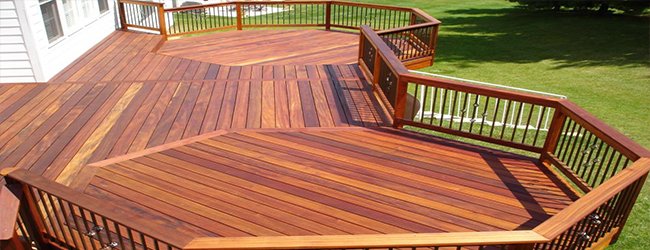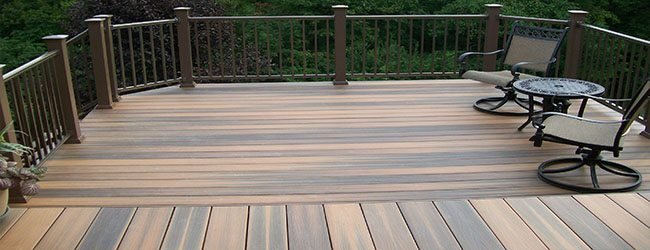Tigerwood Pros and Cons: Is It Right for You?
The time has come for another material comparison! In this article we’ll go over Tigerwood decking – an exotic hardwood – and compare it to composite materials like Fiberon or EverGrain.
While both are considered top-notch and high quality materials for decking, there are a few differences that should be noted prior to selecting one or the other for your next project.
First, we’ll go over the pros and cons of Tigerwood
As an exotic hardwood, Tigerwood provides a natural resistance to rot and decay and can last up to 30 plus years without any sort of preservatives!
Tigerwood is also known to be one of the hardest and most durable hardwoods, which will provide even more resistance to things like scratching. So if you have pets, patio furniture, or expect your deck to see heavy foot traffic, then having a higher resistance to scratching is a useful feature.
Pro Tip: Tigerwood also possesses a look that is completely unique to itself. So many composite products or stains try to mimic this look, but nothing ever compares to the real thing.
One of the negatives that is highly associated with Tigerwood, is that it is extremely expensive compared to other materials. It’s important to note that yes, Tigerwood can be an expensive material, but that’s generally the case when compared to traditional softwoods.
When comparing it to composites, both are more expensive than softwoods but hardwoods are cheaper than composites, thus they will be the more economical choice.
Pro Tip: Tigerwood has one of the highest market values out of all decking materials. If pricing is a factor for your project, take this into consideration.
source: houzz.com
Now that we’ve covered Tigerwood, we’ll go over how it compares to composite materials…
As mentioned above, in terms of pricing the more economical option would be selecting Tigerwood. But what about other facets, like durability and lifespan?
Composite decking is an ideal material for the busy homeowner. Having spare moments are hard to come by, so not everyone has the ability to perform consistent maintenance for their deck. This is where composites have the upper hand. With a simple power wash, your composite deck can look brand new whereas a natural wooden deck would likely need cleanings and re-stains.
These are other important factors to take into consideration when choosing your building materials. Overall, composites also provide solid resistance to harmful variables that is coupled with a 20-25 year warranty. So you know that you’ll get at least 20 years out of your deck.
Pro Tip: A “red flag” we’ve noticed over the past 40 years of working in the lumber industry, is that a warranty with any man-made product generally points to one thing: expected or impending failure of a product.
With proper care and upkeep, a deck made out of Tigerwood can last virtually a lifetime. But a composite deck – even with good maintenance – will most likely see some sort of failure in design before a Tigerwood one does.
Concluding Thoughts
So which material is right for you? That decision is completely up to you!
We always like to emphasize that the “best” materials are always the ones that fit your needs, desires, and lifestyle the best.
By supplying you all the information, we want you to be able to make the most informed decision as possible so when the time comes to start your project, you’re not just ready – but you’re excited and anxious to get the ball rolling.





